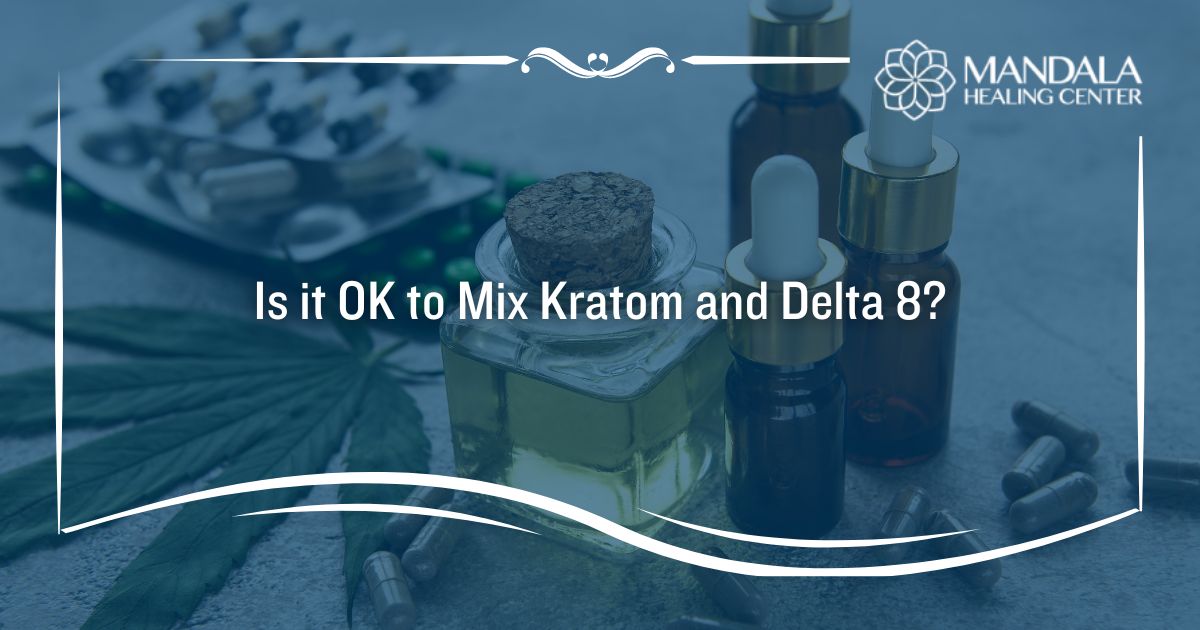Many people believe that all substances you can purchase legally are safe to use. However, in many states, intoxicating substances are available for purchase in smoke shops and corner stores–and many of them have the potential for addiction and other severe consequences.
Delta-8 and kratom are two substances that are sold legally in many areas of the country. These products are often marketed as safe and natural, but are unregulated and have little concrete proof of long-term safety.
People who use these substances may believe that, because they’re legal, they are safer than illicit drugs. Some people may wonder if it is safe to mix kratom and Delta-8 or other legal substances.
The answer is complicated, and more research is needed into the safety of mixing Delta-8 and kratom. However, many health experts believe that these products can be dangerous when used alone and mixed with other drugs.
This article will provide an overview of these intoxicating legal substances and the risks of mixing kratom and Delta-8. Reach out to the Mandala Healing Center specialists now to learn about our substance abuse programs or to find support at any stage of your recovery journey.
What is Kratom?
Kratom is a supplement derived from the leaves of a Southeast Asian evergreen tree. People ingest kratom by brewing the leaves into a tea, chewing the leaves, taking it orally in pill form, or using a liquid extract.
Kratom is often advertised as having numerous health benefits, including pain relief. People may take it because they believe it will relieve panic attacks, suppress their appetite, or relieve cramps.
There is little evidence that kratom has any health benefits. Researchers believe that kratom binds to the brain’s opioid receptors and that the dose used affects the experience people have when taking it.
At lower doses, users may experience increased energy and other stimulant effects. In high doses, kratom can cause some users to feel a sense of euphoria, meaning a rush of warmth, pleasure, and well-being. Some users experience pain relief when taking large doses. People may also feel sedated or sleepy after ingesting large amounts of kratom.
The Effects and Risks of Kratom
The effects of kratom usually develop quickly after someone ingests it. In just 5 to 10 minutes, people may begin to experience a range of physical and psychological effects.
Some of the most common short and long-term effects of kratom include:
- Nausea
- Vomiting
- Chills
- Dry mouth
- Weight loss
- Constipation
- Hallucinations
- Dizziness
- Urinary problems
- Delusions
- Depression
- Seizure
- Coma
- Depressed breathing
The effects of kratom can become more severe at higher doses. Mixing kratom with other substances may intensify the drug’s effects and put users at greater risk of complications.
More research into the risks of kratom is needed. Some animal studies suggest that kratom may be more potent than morphine and that it may be possible for kratom to be transmitted in breast milk.
Kratom is currently considered to be a supplement, and supplements are unregulated by the FDA. This means that any kratom products sold in stores are not regulated. The quality and safety of these products may vary.
What is Delta-8?
Delta-8 THC is a compound that is similar to Delta-9 THC, the chemical compound in marijuana that causes intoxication. It is a naturally-occurring substance found in marijuana and hemp plants.
Delta-8 is less potent than Delta-9 but can cause a mild “high” when ingested. People may ingest Delta-8 by eating gummies, in vaping cartridges, or by taking it orally in capsule form.
Delta-8 is legal in many areas where marijuana is still prohibited and can often be sold in smoke shops, specialty retailers, and even convenience stores.
The Effects and Risks of Delta-8
The effects of Delta-8 are similar to those of the Delta-9 found in marijuana. Users may experience:
- Dry mouth
- Relaxation
- Drowsiness
- Elevated mood
- Calm
- Red eyes
In high doses, Delta-8 users may experience sensory enhancement. They may see colors more vividly or experience music differently. But in especially large amounts, Delta-8 can have unwanted side effects, including:
- Mood swings
- Paranoia
- Hallucinations
- Anxiety
Frequent or heavy Delta-8 use may lead to tolerance, which means users need to take more and more of the substance to get the desired effect. People who use it for a long time may also experience withdrawal symptoms if they suddenly stop taking it. Tolerance and withdrawal are signs of physical dependence or addiction.
Is it OK to Mix Kratom and Delta-8?
There is very little evidence on the risks of using kratom and Delta-8 at the same time. In some cases, mixing kratom and other substances can enhance the effects and dangers of both substances.
There is some overlap between the effects of kratom and Delta-8. It’s likely that people will experience intensified effects if they choose to mix kratom and Delta-8, but there is no current clinical research into the risks and effects of this combination. This could potentially lead to:
- Increased sedation and drowsiness
- Respiratory depression
- Dizziness
- Lightheadedness
- Increased heart rate
- Anxiety
- Paranoia
- Nausea
- Vomiting
- Cognitive impairment
- Impaired motor coordination
It’s important to remember that kratom and Delta-8 products are currently unregulated. It is nearly impossible to determine the potency, safety, or quality of these products. Using kratom, Delta-8, and other unregulated substances may put you at risk of complications, especially if you mix them.
Find Help Now
If you or someone you love needs help to stop using any substances, you are not alone. Reach out to the Mandala Healing Center team now to learn about our supportive, integrative substance abuse treatment programs.












